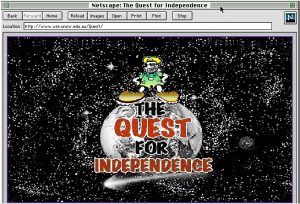I was called out on a tweet pointing to an article on mobile. And, I have to say, I thought it was pretty underwhelming. It was the ‘old school’ view of mlearning, and I think that the post largely missed the point. So I thought it’d be valuable to walk through the claims. What I’m trying to accomplish is share how my thinking works, and perhaps contaminate you with a wee bit of it too ;). We need to get better at cutting through the hype (part of the debunking skills), and that includes microlearning and mobile malarkey as well.
The post makes four claims for why mobile is on the rise:
- the advancements in mobile technology
- the desire for small content
- more engaging content
- consumption ‘on the go’
So let’s go through these. However, first I’m going to challenge the assumption!
Mobile is not ‘on the rise’. That’s so 2012. Mobile is well past the ‘new’ stage. Heck, Google was arguing ‘mobile first’ back in 2010! Even here in the US, it’s mainstream, and it’s been the ‘goto’ mode in other countries for much longer.
Now, the advancements in mobile technology are continuing, and impressive. Things like sensors for contextual information, networking for social connections, new interaction capabilities like pressure-sensitivity, and higher resolution screens and faster processors mean new capabilities. What the article is talking about, is cutting edge content. Yes, video can be useful ‘on demand’, and interactivity can be powerful. In context. But they’re not picking up on that. This is still the ‘get training wherever you are’ mentality. Mobile is really not about courses! But maybe they’ll get better..
Next is the chunks. Ok, so I’ve already weighed in on ‘microlearning’. Yes, small is better. It does matter whether you’re talking performance support or spaced learning, but small is good. However, this article touts that we prefer smaller chunks (er, yes, and that’s not a good indicator). And that we benefit from smaller. Yes, but this is still about ‘content consumption’. Mobile can, and should be more than that.
On to engagement. Here the claim is that these small bits are more engaging, but that we can do interactive things as well. And this is good: mini-scenarios (better written multiple choice), even branching scenarios can lead to better. However, here they’re talking quizzes and infographics. Again, mostly content, and also focused on knowledge, not skills. This isn’t where the emphasis should be. Spaced learning yes, but reactivation – reconceptualization, recontextualization, and reapplication – not content dump and knowledge test.
Finally, it’s about remote workers. Yes, again, contextualization to give the right thing, to the right person, at the right time and place. But no, they’re talking about accessing training where/when/ever. Yes, that’s nice. But not intrinsically exciting, and definitely not really capitalizing on mobile’s promise.
Look, the real mobile opportunity is about performance support and contextualized learning. Spaced learning is good (though not unique to mobile). But to argue mobile’s on the rise, and it’s about content, is to misconstrue the state of the industry and the opportunity. This is obviously a sales pitch for their mobile content delivery, but get clear about what you want from mobile. It’s a platform, so once you start people will expect more. It’s best if you need to think strategically about all that you can do and ensure you’ve seen the full picture before you settle on any one solution.




